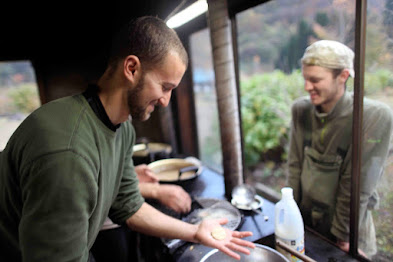Tsukan
 |
My aim at Antaiji is to practice simply living the life that I have without striving to be someone or somewhere else. I don’t even wish to be someone who is free of desire and dissatisfaction. My life will always include doubt, dis-ease, and yearning for something better. I believe that to be free of these things is not to eliminate them, but rather to live and embody them completely. There is no escape from my life, only the possibility of learning to trust in its completeness right now. The only place to go is toward deeper intimacy with this completion. To bring this understanding out of my head and into my bones is the great task of my life, and the reason I am here at Antaiji.
In undertaking this task, the only place I can possibly start is where I am. Where I am most of the time is in some state of suffering born out of a basic rejection of reality. This means that to become intimate with my life is to become intimate with suffering. I don't mean wallowing in it. I mean welcoming it, observing its forms and variations, and letting it go as it pleases. Zazen is exactly this practice of welcoming, observing, and letting go. A daily life of zazen means doing this billions of times. The formal posture of seated meditation is just the physical symbol of this practice, which can be done at all times and places. Since zazen is nothing other than accepting life, it can be done perfectly at any time by exactly everyone alive. Accepting reality is also the most difficult thing in the world, because reality includes unbearable dissatisfaction. So most of us have to rely on the artificial structures of places like Antaiji in order to persist in its practice, at least initially. The more I am supported in practice at Antaiji, the more familiar I get with the particular way I manifest my own rejection of reality through patterns of behavior and thought. These are my demons, mine forever like family, and if I really want to live my own life I cannot push them away. Uchiyama Roshi taught that we should even learn to love watching our demons at work in the same way that we love watching villains in movies. This doesn't mean indulging their every demand. It just means listening to them and learning from them, finding out who they are and what they want, and letting them go on their way naturally. But before we can do this, we first have to allow ourselves to see them clearly and give them some specific names.
My most persistent demon manifests as a chameleon that constantly changes its color to suit its environment. Because deep down I don't believe that my life has any inherent value, or that there is any substance or desirability in who I naturally am, it becomes very important to produce an identity that is salable to those around me. If they buy my product, they are buying me, and giving my life approval and meaning. But the demands of the environment and the people in it are constantly changing, hence the need to be like a chameleon. At Antaiji, I watch myself change my way of speaking, the way I carry my body, and the content of what I express to get the most favorable possible response from whomever I am interacting with. I become like a mirror for the other's most desired traits, reflecting the best part of themselves back at them. I lose myself completely in the process, truly becoming what the other is looking for. For the most part I do this intuitively and subconsciously, and I often don't realize the role I've been playing until after the particular performance is over and I've moved on to another one, which may look completely different.
Since I arrived at Antaiji, my chameleon instinct has also attempted to grasp just what defines the "model Antaiji citizen" and project that image as completely as possible. It might look like being a diligent person, an efficient person, an unselfish person, a self-reliant person, a stoic person, a practical person, a committed person, a studious person, a person who is well-adapted to Japanese culture, a "spiritual" person, a person who is "ready to die", etc. The image I project is not always entirely false, but it is almost always extreme in its claims and therefore misleading to those who see it. The result is that other people--and I myself--form an impression of me that isn't true to reality. I then work very hard to maintain this mis-impression for the sake of continued approval from within and without. The burden of this self-and-other deception is exhausting, however, and eventually I lose the energy required for continued performance. When this happens, I inevitably disappoint (or at least confuse) others, and I wind up feeling resentful of them for being so willingly fooled.
In the past, I would reach this point in the pattern and then abandon whatever situation I was in quickly and decisively. Real commitment to anything or anyone was impossible. Though I had no problem with the initial act of making a big commitment ("Yes! How exciting! A new identity!"), I could never follow anything through once the manufactured mask of self became too heavy to wear. It was always much easier to do the work of creating an entirely new identity with new people in a different place than to face squarely the reality that I have no clue who I really am. Eventually, though, I started to feel so alienated that I found my roundabout way to a zendo. The act of zazen was almost non-stop psychological agony. To face a wall, with no one looking at me, with no one's approval to seek, with no one and nothing but my own self and my own life, was disorienting to the point of being unbearable. From the beginning I have run away from practice in thousands of ways small and large, attempting to escape the pain using all my well-worn tools and techniques. But after opening the wound I haven't been able to close it again. The wall--the bare reality of my own life--seems to always call me back.
When I first encountered the teaching that there is no abiding self (the Heart Sutra's "form itself is emptiness"), it made perfect sense to me. It seemed so clear from my own life experience that there was nothing in me I could call my authentic self, my "real me." I had gone through so many and such drastic identity shifts--how could there be any abiding core? I felt like a living testament to identity's impermanence. But then came the teaching of "Yes, but." Emptiness is itself form. No self, but also not no self. Somehow, I am someone. Somehow, my life is blossoming--to borrow another of Uchiyama's favorite metaphors--as a particular flower. As we at Antaiji practice together, eat together, work together, go to the toilet together, bathe together, it becomes increasingly obvious that we are all exactly ourselves. Even if after years and years of practice we could perform every zen form perfectly, none of us could do anything the same way. As much as I might wish to drink my tea and hold my chopsticks exactly like the enlightened Docho-san, I'll always just do it exactly like me.
Dogen's commentary on the last of the Ten Grave Bodhisattva Precepts is: "To do something by ourselves, without copying others, is to become an example to the world, and the merit of this becomes the source of all wisdom." But how? How do I do what only I can do? How can I become myself when all that I know is pretending to be someone else?
The obvious answer seems to be that I already am, and I already have. How could I be anything other than myself, or live any life but my own? The pain, the performing, the unending dissatisfaction with this body, mind, and life--it's all part of the package. I am living exactly my life, right now, as difficult as it may be to accept. The simplicity and directness of the life here at Antaiji--with the practice of zazen as its fundamental symbol--is a constant reminder of this basic truth. We are all just living together day by day, doing our work and facing the wall. No one looking, alone together, no one to answer to in the end but ourselves.
So my aim here is to become my life of confusion, doubt, deception, and dissatisfaction, and live it one hundred percent. I want to become so familiar with the scenery of my life that even my most horrible demons become trusted friends. I want to know in my bones that there is no step I can take that is not my own, that this body any mind are exactly all that I have, and that that is exactly enough. Nowhere to go, no one else to become, nothing to prepare for. And from that place of "nowhere to go," I want to stand up on my own feet and walk wherever I need to go. It might take a very long time.




